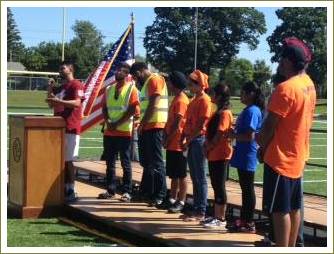
As we commemorate the one year anniversary of the hate violence that gripped the community of Oak Creek, Wisconsin, when a gunman stormed into the Sikh Temple of Wisconsin on the morning of August 5, 2012. Our hearts are with the families and loved ones of Paramjit Kaur, Prakash Singh, Ranjit Singh, Satwant Singh Kaleka, Sita Singh and Suveg Singh who lost their lives in the massacre. As we reflect on this day one year later, it is important to place the Oak Creek tragedy in a broader history and context of racial and religious injustice in our country. To help us understand, reflect and move forward, SAALT is featuring a blog series featuring a range of diverse voices.
The views and opinions expressed in this blog post do not reflect the positions or opinions of SAALT. They should be understood solely as the personal opinion of the author.
August 5, 2013: Growing up in a small town in North Carolina as a child of Indian-born parents, I remember struggling with identity and difference early in life. As a young girl, I remember teachers asking me to decide my race – the choices being only black or white. I recall being asked why I didn’t go to church and being questioned about my “strange” name. I remember the first time I felt that sinking, anxious feeling in my stomach that I later learned was fear – as a man berated my father for wearing a turban while we ate dinner at Pizza Hut. I was so young that I wasn’t even sure how to articulate all of the emotions I was feeling and the questions that they aroused in me. As I grew older, however, I wanted to conquer my fear – to be fearless, to know my rights under the law, to understand how to educate others about my Sikh identity, to celebrate differences and to make a difference.
 Jasmeet Kaur Sidhu Law & Policy Consultant, SAALT |
As a mother to two three-year old Sikh girls, I cannot remember a more terrifying feeling. As the news spread we all turned on our televisions, desperate for answers, for some reason for this kind of attack on a community of peace. Did the gunman say anything before he opened fire? Did he know anyone in the community? Why would he carry out such an attack? Just as after Newtown, Aurora and other tragedies earlier that same year, I felt a sense of helplessness and frustration with the violence, hatred and senselessness that was becoming commonplace in our society.
In those moments, I did a lot of soul searching. I think we all did. As a parent, I had to think beyond myself. I had to ask, what do I want for my children? What kind of life do I want them to have? Do I want them to be afraid to go to school, to the movies, to religious service? In Sikhism, there is a concept called Chardi Kala. It means resilience – maintaining strength and spirit – especially in the face of fear and pain. It is something so intrinsic to the fabric of our faith, that I can’t remember a time when my parents didn’t remind me of its value. People find strength in a lot of different ways in the wake of being attacked. In the days following Newtown, Aurora, Oak Creek, and most recently the death of Trayvon Martin, Americans have struggled to make sense of senseless acts of violence. We have felt helpless when faced with unthinkable and unforeseen tragedy. But we are not helpless. We can make a difference moving forward. We can chose to remain in Chardi Kala, to focus on how we can transform policies and create lasting change, to bring injustice to light and to unite, without fear but with determination to honor those who lost their lives.
The hate crime and execution of six Sikhs at the Oak Creek Gurdwara led to a Senate hearing on hate violence, just weeks after the incident, and raised awareness of the rise in White Supremacy groups in the United States. Earlier this year, education, community organizing and advocacy efforts of civil rights and faith-based organizations resulted in the FBI adding Sikhs as a category in tracking incidents of hate crimes. And just this week, the End Racial Profiling Act was re-introduced in the House of Representatives, with hopes of eradicating the unjust and dehumanizing effects of profiling on minority communities. Through all of the tragedies that brought us to our knees last year, the bonds of human compassion and the desire to be strong for our children and communities united us in a common goal.
Before Oak Creek, Robbie Parker may have never known Pardeep Kaleka – their paths would never have crossed. But on August 5th, Mr. Parker – who lost his daughter in the Newtown Massacre – will speak on the one-year anniversary of the Oak Creek Temple Shooting, at the Chardi Kala 6K Memorial Walk. He will help people like Mr. Kaleka – who lost his father in the Oak Creek shooting – understand how to move forward in the face of tragedy. In this way a son will gain strength from a father and a father will be able to comfort someone else’s child. We will all be a little closer as Americans, as survivors and as advocates for a better tomorrow.
What do I want for my daughters? I want them to be fearless and determined, to remain in Chardi Kala. I want them to remember Paramjit Kaur, Satwant Singh Kaleka, Prakesh Singh, Sita Singh, Ranjit Singh and Suveg Singh. And to honor their memories by remaining resolute in their right to be Sikhs, to be Americans and to create change.
**********
Jasmeet Kaur Sidhu
Law and Policy Consultant
South Asian Americans Leading Together, SAALT
Jasmeet Kaur Sidhu is a Law and Policy Consultant in SAALT’s Washington, DC office. The current focus of Jasmeet’s work is immigration reform and xenophobia/hate crimes in the United States. Jasmeet has an Masters of Law (LLM) in International Law and Legal Studies with a focus on Human Rights Law. She attended law school at the University of North Carolina School of Law and obtained her undergraduate degree in political science and comparative area studies (Middle East and North Africa) from Duke University.
Before joining SAALT, Jasmeet had extensive experience in the private sector and non-profit world. Following law school, Jasmeet was a civil litigator at the law firms of K&L Gates and Williams Mullen. She then went on to join Alliance for Justice (AFJ), where she was Senior Counsel and spearheaded AFJ’s Immigrant Rights Initiative. Jasmeet was also a legal consultant with GLSEN (Gay, Lesbian & Straight Education Network), working on issues involving bullying and harassment of LGBTI students. Most recently, while obtaining her LLM, Jasmeet was a Volunteer Attorney with the Refugee Protection Program at Human Rights First and a Legal Extern with the Child Trafficking Project at the International Centre for Missing and Exploited Children.
